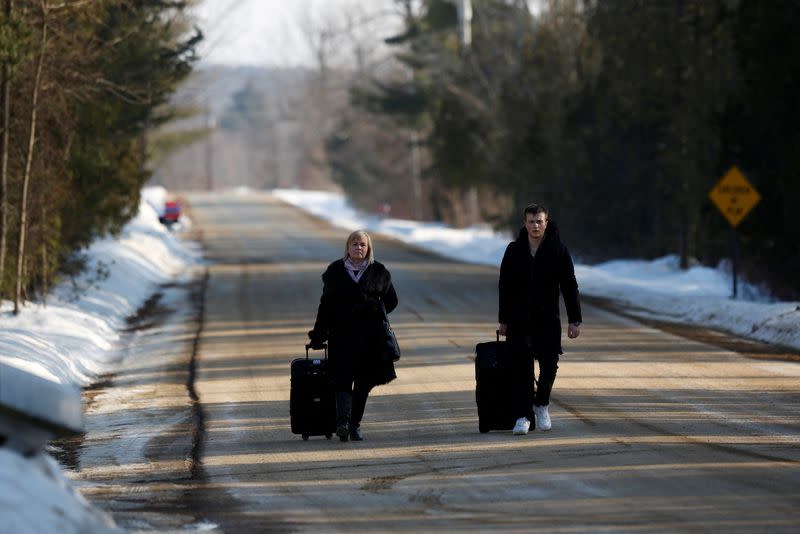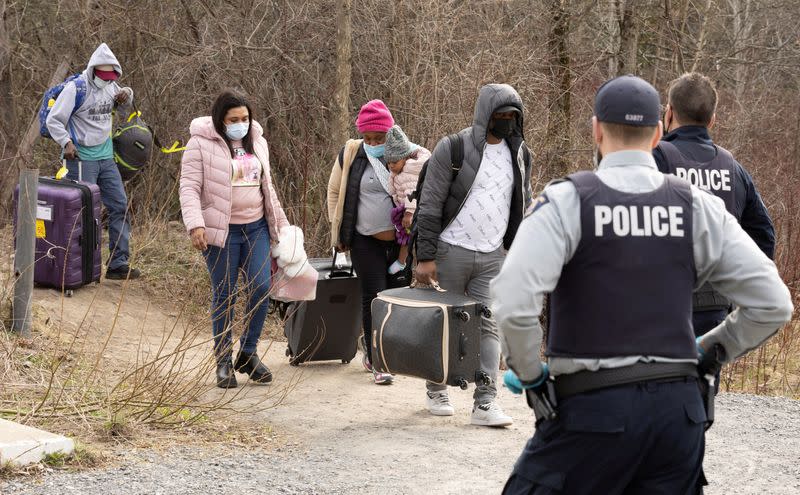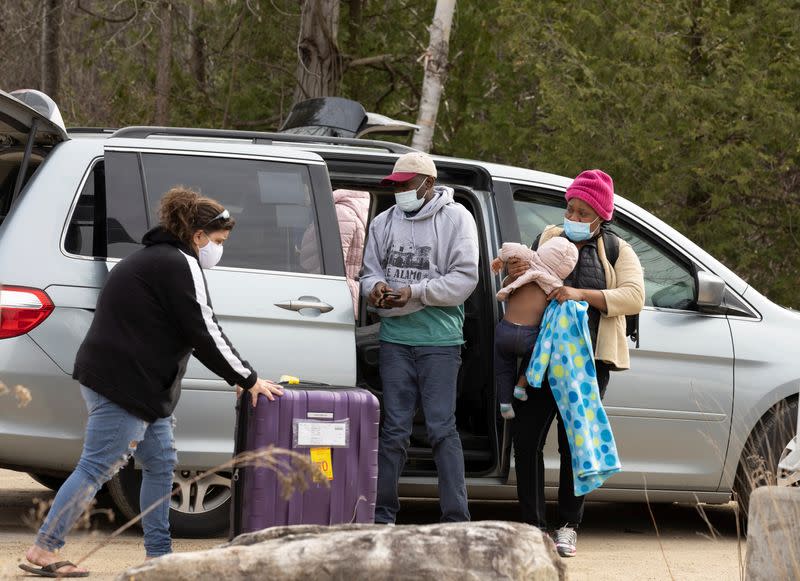Rise in asylum-seekers entering Canada from U.S. becomes flashpoint again
By Anna Mehler Paperny
TORONTO (Reuters) - Thousands of asylum-seekers crossing irregularly into Canada via a dirt path between New York State and the province of Quebec are becoming a political flashpoint once again in Canada as the Quebec government says it can no longer accommodate the rising numbers.
The movement of asylum-seekers into Canada from the United States has picked up since Canada lifted COVID-19 pandemic restrictions in late 2021, a trend mirroring global displacement. More than 39,000 refugees entered Canada last year via unofficial crossings, the vast majority via Roxham Road linking Quebec and New York State. The number crossing into Quebec more than doubled last year compared to 2017, when Roxham Road made international headlines.
Almost 5,000 more people seeking asylum crossed into Canada between official border crossings last month - the highest January since the Canadian government started breaking down this data in 2017. That 2017 spike was spurred in part by then-U.S. President Donald Trump's crackdown on migrants.
Canada is a signatory to the international Refugee Convention under which Canada must adjudicate most refugee claims with limited exceptions. The Convention has limitations to the definition of refugee; Canadian law has exceptions as to who can access refugee protection in Canada.
The influx has prompted Quebec Premier Francois Legault to ask Prime Minister Justin Trudeau's government to resettle refugee claimants in other provinces and to issue work permits more swiftly as the province's "capacity to take care of the asylum-seekers is now largely exceeded."
Quebec is proud of its "tradition of welcoming refugees" but its services are strained, Legault wrote in an op-ed in Canada's Globe and Mail newspaper this week. He has expressed concern in the past that non-francophone newcomers would hamper government efforts to promote the French language.
The federal government says it has transferred more than 5,800 asylum-seekers out of Quebec since June. A spokesperson for Canada's Immigration, Refugees and Citizenship minister said in a statement on Tuesday the government is working with communities outside Quebec on a "pan-Canadian approach" that would include resettling refugee claimants elsewhere.
Legault also called on Canada to push the United States to rewrite the Safe Third Country Agreement (STCA)- something Canada says it is doing.
Under the STCA, anyone trying to cross the Canada-U.S. border in either direction at a formal border crossing will be turned around and told to apply for asylum in the first of the two countries they arrived in, with few exceptions.
Canada wants to rewrite this agreement so it can turn back asylum-seekers apprehended anywhere along the border - not just at formal crossings.
The agreement is the reason people wanting to claim refugee status in Canada enter the country via Roxham Road in Quebec: Otherwise they could come to Canada at any U.S. border crossing.
Twice, Canadian federal courts have struck down the agreement and, twice, appeals courts have upheld it. The latest case was argued at Canada's Supreme Court last fall and a ruling is expected in the coming months.
Speaking to reporters on Wednesday, Trudeau said his government had been trying to "close" Roxham Road for years by rewriting the STCA.
"The challenge is not to say 'Oh, we should close it.' The challenge is, how to close it, how to make sure that people aren't choosing to cross irregularly into Canada, to protect the integrity of our immigration system but also stay true to the values that we have."
Abdulla Daoud, executive director of the Refugee Centre in Montreal, said bureaucratic delay is the real problem with the asylum-seeker influx.
"If we were to move them to any other province, we're not really solving anything," said Daoud, adding that community organizations will still be overwhelmed because asylum-seekers lack the documents needed to work and access some government services.
Daoud said his organization is seeing many recent migrants coming from Latin America, many saying they are fleeing persecution.
Refugee advocates argue abolishing the agreement entirely, or inserting additional exemptions, would let asylum-seekers enter Canada at regular border crossings elsewhere in the country, not just at Roxham Road, thus alleviating pressure on Quebec.
On Tuesday, opposition Conservative leader Pierre Poilievre urged Trudeau to "close" Roxham Road. Poilievre referenced a COVID-19 policy under which Canada turned back asylum-seekers crossing between ports of entry, a policy that was being challenged in court when it was rescinded.
But "sealing the border is not practical," said refugee lawyer Maureen Silcoff.
"It's in nobody's interest for people to arrive undetected and to take dangerous routes to cross."
(Reporting by Anna Mehler Paperny; Editing by Denny Thomas and Josie Kao)




